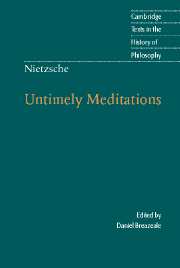Book contents
- Frontmatter
- Contents
- Introduction
- Chronology
- Further reading
- Note on the text
- Untimely Meditations
- David Strauss, the Confessor and the Writer
- On the Uses and Disadvantages of History for Life
- Schopenhauer as Educator
- Richard Wagner in Bayreuth
- Glossary of names
- Notes
- Index
- Cambridge texts in the history of philosophy
Introduction
Published online by Cambridge University Press: 05 June 2012
- Frontmatter
- Contents
- Introduction
- Chronology
- Further reading
- Note on the text
- Untimely Meditations
- David Strauss, the Confessor and the Writer
- On the Uses and Disadvantages of History for Life
- Schopenhauer as Educator
- Richard Wagner in Bayreuth
- Glossary of names
- Notes
- Index
- Cambridge texts in the history of philosophy
Summary
Individually and collectively, the four ‘untimely meditations’ are unquestionably among Nietzsche's most widely neglected works. Published between 1873 and 1876, they seem to lack both the dramatic originality of the work that preceded them (The Birth of Tragedy) and the epigrammatic brilliance of the book that followed (Human, All Too Human). Their ostensible subjects are so diverse – David Strauss, the study of history, Arthur Schopenhauer and Richard Wagner – that they seem to be connected by little beyond their collective title and common form: namely, that of the traditional polemical essay divided into numbered, untitled sections.
Upon closer examination, however, they reveal a thematic unity that is not always obvious at first. The Untimely Meditations contain important, early discussions of such essential ‘Nietzschean’ subjects as the relationship between life, art and philosophy; the character and cultivation of the ‘true self’; education (and its vital erotic dimension), and the difference between genuine wisdom and mere knowledge (or ‘science’). Moreover, these four short works – especially the last two – always retained a special, deeply personal significance for their author, who considered them to be key documents for understanding his development as a philosopher. They are not, admittedly, as immediately accessible as many of Nietzsche's other writings, largely because of the way in which the Untimely Meditations are related to specific events, authors, and intellectual and cultural movements of his own era.
- Type
- Chapter
- Information
- Nietzsche: Untimely Meditations , pp. vii - xxxivPublisher: Cambridge University PressPrint publication year: 1997

